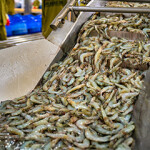Michigan's seafood industry, Mi Fresh Fish host outreach event at the state's capitol

The Michigan Fish Producers Association and Michigan Aquaculture Association, with coordination and organizational support from Michigan Sea Grant and Monte Consulting through the Mi Fresh Fish marketing campaign, hosted the first-ever Mi Fresh Fish Expo in June to bring greater awareness to the U.S. state of Michigan’s seafood industry.
More than 500 attendees at the one-day event in Lansing, the U.S. state’s capital, discovered where Michigan fish come from, how they are cared for and harvested, and why they are an important part of the local economy. The organizations launched the new expo to bring awareness to the industries in the most direct way possible – through showcasing local seafood products and the families who catch and raise them.
“Not only did we get to educate the public about Michigan's historical commercial fishing industry, but we also got to talk with legislators about the inner workings of our fisheries,” Bay Port Fish Company Representative Lakon Williams said. “Most were amazed with our fishery and fascinated by the struggles we face to stay afloat each year. We are truly grateful to have had such an experience telling folks about our family fishery.”
Using input from the industry, Mi Fresh Fish is an educational marketing campaign and brand created to raise awareness that seafood production exists in Michigan, and that they are not just businesses, but also neighbors and residents in the community. Mi Fresh Fish focuses on Michigan’s commercial fishing industry by humanizing the industry and supporting it.
The event also helped the commercial fishing and aquaculture industries get to know each other better, according to Amanda Holmes, the owner of Fishtown Preservation in Leland, Michigan.
“The business right behind me was Cedarbrook Trout Farms. The fish farmer said that he thought Fishtown was just for tourists. He had no idea that we own and operate the commercial vessels and was thrilled to learn that it’s also our goal to educate as many people as possible about the past and present of the Great Lakes fishing industry,” Holmes said.
More than 90 percent of the catch of Michigan’s state-licensed commercial fishermen harvest is lake whitefish. Only a few licensees in Lake Huron are allowed to catch yellow perch, but this remains an issue of contention with recreational harvesters. There are several aquaculture firms in Michigan raising walleye, but primarily for stocking in waters for recreational fishing. Mi Fresh Fish said most seafood consumed in Michigan is imported, and even walleye and yellow perch are from the Great Lakes, which is practically all imported from Canada.
In 2020, Michigan received millions of dollars in federal funding from the CARES Act II for Covid-19 relief in support of commercial fisheries and aquaculture establishments, a portion of which was used to create and fund Mi Fresh Fish in 2022. However, it could not prevent the closure of several seafood businesses due to the loss of retail sales, and some companies were not eligible to be covered by the Covid relief funds, according to the organization.
According to Mi Fresh Fish, Michigan’s commercial fisheries landscape underwent grueling challenges over the past three years, including the majority of markets shifting from 80 percent wholesale to 80 percent retail and then back, to quotas decreasing, to political tensions rising due to proposed legislation that would limit commercial harvests, which precipitated a lawsuit from the Michigan Fish Producers Association against the Michigan Department of Natural Resources (DNR).
Additionally, the state of Michigan engaged in fisheries negotiations with Tribal Nations over the 2020 Consent Decree, which remain ongoing.
Reporting by Lauren N. Jescovitch and Amanda Holmes
Photo courtesy of Michigan Sea Grant






Share